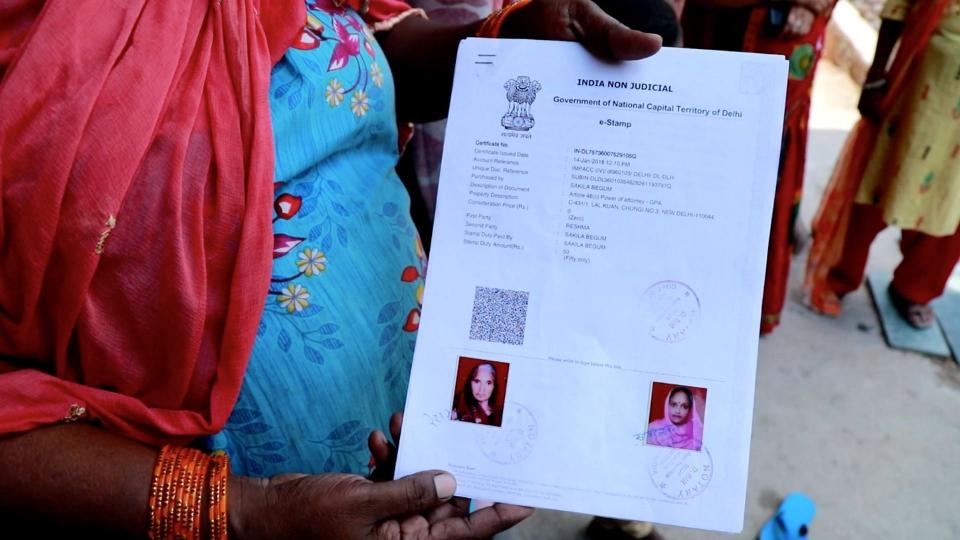Khori Village Eviction Order Leaves Residents Crying for Help

(This story was first published on 23 June 2021. It has been reposted from The Quint's archives in the light of authorities in Faridabad demolishing several houses in the Khori village on 14 July.)
On 7 June, the Supreme Court of India upheld its order from 2020 to evict the Khori Gaon Basti, situated on the border of Delhi and Haryana. Home to at least 10,000 low and middle income families, the village – the apex court observed – is an encroachment on the Aravali Forest land.
While the demolition drive has already started, there are no concrete plans yet regarding rehabilitation of over 1 lakh residents of the village.
The Quint visited Khori, where these residents have been left crying for help as they stare at displacement in the middle of the COVID-19 pandemic.
Also Read: Fire at Rohingya Refugee Camp in Delhi: 230 People Left Homeless
‘Scammed By Dealers’
Sakila Begum, 36, says that her family invested all of their life savings into buying this land. “The dealer told us that it’s absolutely safe to buy land here and it is the other side of the Aravali that is in trouble.” she said.
"“Why don’t they go after the dealers who sold us this land? We are not at fault here. We saved whatever little we made to buy land in Khori village. We can’t afford land worth Rs 10-12 lakh.”" - Sakila Begum, Resident, Khori Village

Similar claims were echoed by others in the village, who told us that property dealers in the area sold land to them through Power of Attorney documents.
‘Homeless in a Pandemic, Where Do We Go?’
Residents of Khori village told The Quint that most of them are employed as daily wage labourers in nearby areas of Delhi-NCR and the pandemic has left many without a job.
Pawan Kumar, 24, is an HR professional who lost his job during the COVID-19 pandemic.
“The Supreme Court is just looking at the houses made of concrete, they don’t see humans inside them. Do they not know that we are already reeling under debt because of the pandemic? If they snatch our houses at this point, where will we go?” he told The Quint.
Pawan’s younger sister Sapna concurs. “I am a second year BCom student. Currently, I am supposed to be taking online classes, but how is that even possible with a discharged phone?” she says.
Residents allege that they’ve been living without electricity and water since 7 June, the day the Supreme Court order came out.

Sakila Begum further said that these are pressure tactics being used by the authorities to force people out of their homes.
“They have disconnected our electricity. We are living without electricity and water. We don’t earn enough to afford private water. They charge Rs 1,000 for 1,000 litres of water,” she said.
Depression, Anxiety, Fear: How the Order Claimed Life of a 70-Year-Old
On 17 June, a 70-year-old man in the village died by suicide. Neighbours alleged that it was after he found out that his property would be demolished in the upcoming drive. Sapna spoke to us about his death.
"“He had invested Rs 40-50 lakh in his house which was his hard-earned money. First, the dealers scammed him into buying the land, saying people are already living here. Later, he started building his house bit by bit and then one day, everything is just gone in a flash. What else was he supposed to do?”" - Sapna Kumari, Resident, Khori Village
Sapna further adds that the decision, asking residents to immediately vacate their houses, will prove to be fatal for many. “The Supreme Court gave the order but didn’t think about us. What will we do? Where will we go? This decision, asking us to vacate our houses immediately, will kill us.”
Even As Demand For Rehabilitation Grows, Residents Find Themselves in a Border Dispute

Sitara Khatoon says that her husband is the only earning member in their family of seven and if their house is demolished, they have nowhere to go. “This house is our entire life’s savings, if they come for it, they will have to bury us in its ruins,” she said.
Khatoon and other residents of the village are asking the government to either compensate or rehabilitate them, if they want to clear the land.
“The least the authorities can do is to compensate us with some percentage of money we’ve invested in purchasing this land. That will help us start afresh. Else we will be forced to live on the streets,” Sapna Kumari told The Quint.
While the Haryana government has said that it is working on a plan for rehabilitation, it will exclude those residents who are from outside Haryana and don’t have valid identity proof.
This is a problem for families like Khatoon’s. While she and her children all have Aadhaar cards and voter ID cards of Haryana, her husband is a registered voter in Delhi.
Also Read: Surviving COVID-19: Struggles of Homeless India
. Read more on News Videos by The Quint.Violence in South Africa: Death Toll Rises to 72 as Unrest SpreadsTwitter Is Obsessed With This Picture of Tilda Swinton & Timothée Chalamet . Read more on News Videos by The Quint.

 Yahoo Movies
Yahoo Movies 
